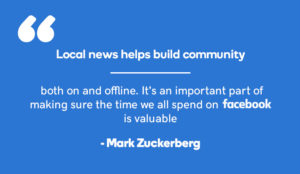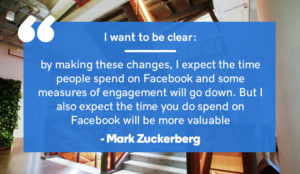No doubt you have heard about it: Facebook has made some serious changes to the algorithm that determines what gets shown on your News Feed.
Mark Zuckerberg made the announcement in early January after a torrid year of publicity for Facebook. Public content from businesses and the media is “crowding out” more personal content from families and friends. Moving forward, Facebook will prioritise content that inspires “meaningful interactions” between users and will give less prominence to the public content primary intended for passive consumption.
Brands and publishers who had spent years building an audience on Facebook began to see sharp drops in their organic reach. To some people the end was nigh. Was this a ploy to get brands to spend more on Facebook ads and on boosting posts? Was this the end of organic reach on Facebook? Were the four horsemen of the apocalypse about to gallop into view?
Fear not, the world has not stopped spinning and a few months after the initial announcement, companies are still doing business online. That said, it would be wrong to downplay the significance of these changes for you and your company.
Here are the seven things you need to know about the algorithm changes to stay ahead of those pesky Facebook horsemen!

1. WATCH AND SEE
Although organic reach is dropping for many businesses and publishers on Facebook, the full impact of the changes has yet to be seen.
Of course, there is a lot we know already. In his initial comments of January 11th, Zuckerberg said it was important that Facebook returned to its original mission of helping people connect with one another. “The research shows that when we use social media to connect with people we care about, it can be good for our well-being”, he wrote. “On the other hand, passively reading articles or watching videos -- even if they're entertaining or informative -- may not be as good”.
Zuckerberg and his team warned that company pages should expect to see “their reach, video watch time and referral traffic decrease” as a result of these changes. But the algorithm would not treat all pages equally. Those companies that posted content to their followers that prompted “meaningful interactions” would be less affected. By contrast, posts that didn’t inspire comments and shares would be earmarked for the biggest decreases in distribution.
Exactly how this will impact the number of people seeing your posts in News Feed is not entirely clear. But Facebook’s guidance is unambiguous in one area: businesses must review the way they are posting on Facebook. And out of this guidance, one thing emerges above all...
- ...COMMENTS ARE KING
There you go. Focus on generating comments. Not just any comments, but “meaningful” comments. Comments that are thought out. Not simply a “Well said” or an “Agreed!” or even a short sentence response, but comments that require effort from the commenter to convey. Comments that demonstrate someone who is willing to engage in a conversation.
Facebook is taking this very seriously indeed. The platform will predict which posts you might want to interact with your friends about, and show these posts higher in feed. “These are posts that inspire back-and-forth discussion in the comments and posts that you might want to share and react to – whether that’s a post from a friend seeking advice, a friend asking for recommendations for a trip, or a news article or video prompting lots of discussion”, Adam Mosseri, head of News Feed at Facebook, remarked.
So take your comments equally seriously. Don’t let comments go unanswered, and create an environment where your commenters feel free to discuss, explore, agree, and disagree on the finer points of your discussion. Get conversations to flow, and the algorithm will reward you.
Which brings us to our next point:
- CONTENT IS KINGMAKER
If you want comments and you want conversation, you will need something for people to talk about: and, nine times out of ten, that something is content.
For years, digital marketing experts have extolled the virtues of exceedingly good content. Marketing without content is like chips without salsa or Torville without Dean, that type of thing. You probably got sick hearing about how necessary and wholesome content is.
Except that the experts are right: well-executed content will set your company, however small, apart. And content happens to be the perfect trigger for online conversations.
So get back to the drawing board and take a hard look at your business’s quarterly content schedule, assuming you have one (please draw one up fast if you don’t). Ask yourself:
- How engaging is your planned content?
- Are you asking the kind of questions your clients and your wider audience want answering?
- Have you done the necessary research on what to create?
- Are you taking feedback on your plan?
Make sure you are creating content that is creative, deep, and relevant to your target audience: the kind of content that doesn’t sensationalise but will prompt conversation.
Also, think about the kinds of content that are particularly good at driving engagement. Facebook points to its live video feature, for example. Live videos on average receive six times as many interactions as regular videos, according to Facebook. “We've seen people interact way more with live videos than regular ones”, Zuckerberg says.
By the same token, be wary of using “engagement-bait” to prompt interactions: Facebook will demote these posts in News Feed. Instead focus on content that is informative, authentic, and accurate.
- EMBRACE LOCAL
So we know the algorithm changes are proving difficult for bigger brands and publishers who got used to large organic reach in News Feed. But is it possible that, through these changes, Facebook is tilting the playing field just a little in the direction of small businesses?
If your business has a local presence, that might just be the case. The truth is Facebook really likes local: so much so that the Palo Alto giant says knowing what is going on in our local community is good for our well being.
“People consistently tell us they want to see more local news on Facebook”, wrote Mark Zuckerberg in a post at the end of January. “Research suggests that reading local news is directly correlated with civic engagement. People who know what's happening around them are more likely to get involved and help make a difference.”
Okay, fair enough. But where’s the business opportunity here?
Well, chances are you and your company are already engaged in the local community: you and your staff live and work in the area, right? So make use of this closeness.
- Produce business content about what’s going on around you.
- Promote local events that are important to you and your company’s products and values.
- Share news and updates about the local scene.
- Contribute to posts from other businesses in your community and from local news publishers.
Remember when every town and community had a local newspaper, and just about everyone read it.
Remember how it would feel to know what was going on around you: reassured at times, concerned at others, but in any event connected.
Help recreate that feeling through your Facebook posts. Get involved, and have a voice.

- BECOME A GROUPY
Yes, doesn’t this sound fun? Facebook likes groups almost as much as it like local. In general, it thinks levels of meaningful engagement inside its groups are higher than the interactions around posts appearing in your News Feed.
So review the groups you are already a member of, research new ones to join, and throw yourself in. Post, comment, make new connections, and get yourself known!
- SEE FIRST
Did you hear about Facebook’s Facebook’s See First feature? Don’t be shy if not: Facebook wants you to know all about it. This function allows your followers to prioritise your posts within their News Feeds.
Each user can select up to 30 people or pages to “See First”: it’s not like you are asking for exclusive rights to their attention. So make sure you are talking to your followers about this feature, and encourage people to select your page to maintain easy access to your posts.
- SHAKE IT UP
It may feel like heresy (there’s a word not often used in conjunction with social media) but Facebook isn’t the only game in town. Nobody is suggesting you break up with Facebook, but there’s no harm in looking around.
What are you doing on other channels? Obviously, it depends on the nature of your business and where your audience is, but LinkedIn, Twitter, Instagram, Medium, Snapchat--to name a few--are worth investing time and attention into if you’re not already.
Keep an open mind and explore different networks. You never know what you might discover.
Whatever you do, don’t spread yourself too thinly. Better to do one or two networks well, than be a social butterfly across many. That won’t gain your company the kind of traction you’re looking for.

ALL THINGS CONSIDERED
Sure, it might be dispiriting to see your organic reach drop for no obvious reason other than Facebook changing up its algorithm. But if you are reading this post, the chances are a good number of your clients and prospective customers are and will remain on Facebook, and you too need to remain invested as a result.
So don’t give up on Facebook too quickly. Instead, embrace the new guidance and look at ways of generating the kind of “meaningful interactions” that will keep a healthy level of interest in your Facebook activity.
But what do you think? Is this a big deal for you, or just a storm in a teacup? What changes have you seen in the performance of your posts? Comment below, and tell us about your experiences.





